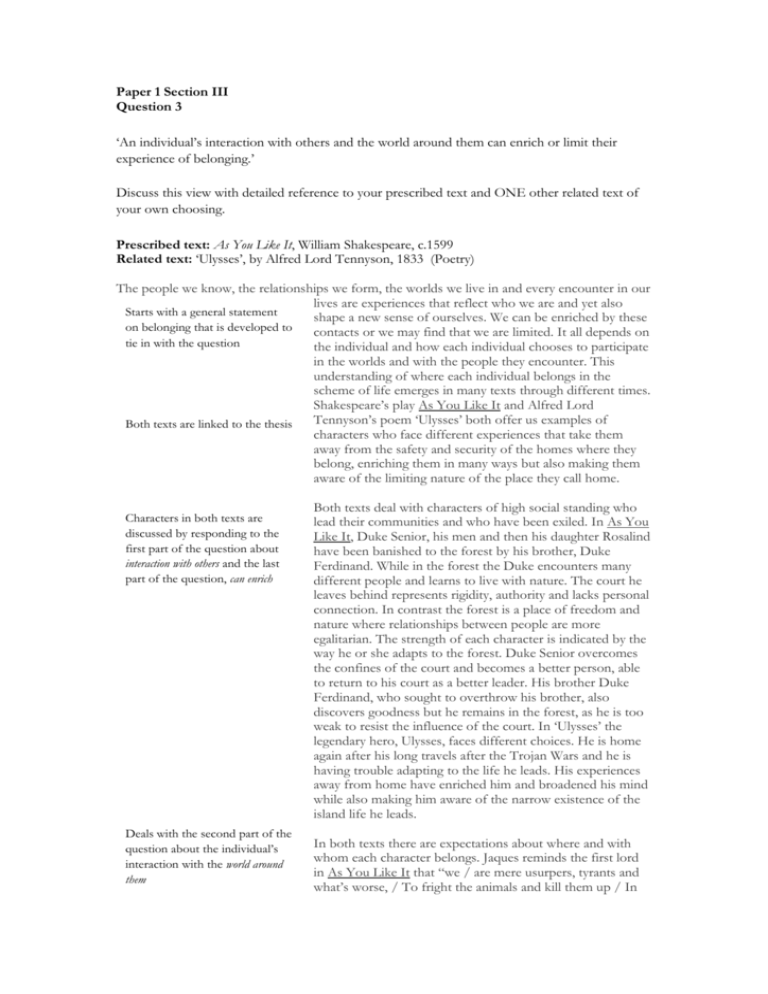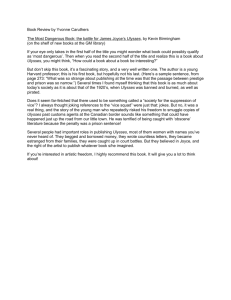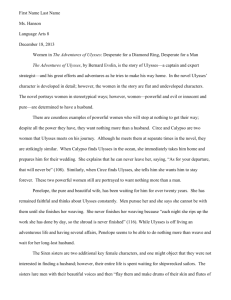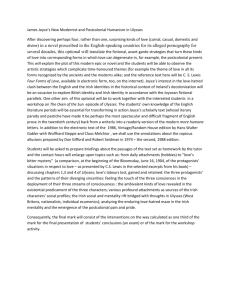Paper 1 Section III Question 3 `An individual`s interaction with others
advertisement

Paper 1 Section III Question 3 ‘An individual’s interaction with others and the world around them can enrich or limit their experience of belonging.’ Discuss this view with detailed reference to your prescribed text and ONE other related text of your own choosing. Prescribed text: As You Like It, William Shakespeare, c.1599 Related text: ‘Ulysses’, by Alfred Lord Tennyson, 1833 (Poetry) The people we know, the relationships we form, the worlds we live in and every encounter in our lives are experiences that reflect who we are and yet also Starts with a general statement shape a new sense of ourselves. We can be enriched by these on belonging that is developed to contacts or we may find that we are limited. It all depends on tie in with the question the individual and how each individual chooses to participate in the worlds and with the people they encounter. This understanding of where each individual belongs in the scheme of life emerges in many texts through different times. Shakespeare’s play As You Like It and Alfred Lord Tennyson’s poem ‘Ulysses’ both offer us examples of Both texts are linked to the thesis characters who face different experiences that take them away from the safety and security of the homes where they belong, enriching them in many ways but also making them aware of the limiting nature of the place they call home. Characters in both texts are discussed by responding to the first part of the question about interaction with others and the last part of the question, can enrich Deals with the second part of the question about the individual’s interaction with the world around them Both texts deal with characters of high social standing who lead their communities and who have been exiled. In As You Like It, Duke Senior, his men and then his daughter Rosalind have been banished to the forest by his brother, Duke Ferdinand. While in the forest the Duke encounters many different people and learns to live with nature. The court he leaves behind represents rigidity, authority and lacks personal connection. In contrast the forest is a place of freedom and nature where relationships between people are more egalitarian. The strength of each character is indicated by the way he or she adapts to the forest. Duke Senior overcomes the confines of the court and becomes a better person, able to return to his court as a better leader. His brother Duke Ferdinand, who sought to overthrow his brother, also discovers goodness but he remains in the forest, as he is too weak to resist the influence of the court. In ‘Ulysses’ the legendary hero, Ulysses, faces different choices. He is home again after his long travels after the Trojan Wars and he is having trouble adapting to the life he leads. His experiences away from home have enriched him and broadened his mind while also making him aware of the narrow existence of the island life he leads. In both texts there are expectations about where and with whom each character belongs. Jaques reminds the first lord in As You Like It that “we / are mere usurpers, tyrants and what’s worse, / To fright the animals and kill them up / In Quotations are used to support statements The words like and unlike establish a connection between the two texts Topic sentence links both texts Through a series of examples the paragraph leads to a conclusion that returns us to the question about enriching and limiting experiences their assigned and native dwelling place”. The animals are the “native burghers of this desert city.” But the men of the court hunt them and take over their natural environment. The sense of what is natural extends to the discussion between Corin and Touchstone on occupations and manners of different people. Touchstone realises that a shepherd’s life is a “private” and “solitary” life but also “vile”, fitting his “humour well”. The manners of the court, Corin observes “are ridiculous in the country as the behaviour of the country is most mockable at the court.” Implicit in this conversation is a criticism of the men of the court who come to the forest and disturb the status quo. Even the Duke Senior, who has the respect of his “co-mates and brothers in exile”, is an intruder in this forest where he sends his men to hunt regularly. Like the Duke, Ulysses in Tennyson’s poem is leading a country but, unlike the Duke, he has returned from his unexpected exile. He carries out his role as king meting out and doling “Unequal laws unto a savage race / That hoard and sleep, and feed, and know not me.” He is also a husband “to an aging wife” and a father to his son, Telemachus. His dissatisfaction with the roles he occupies is clear from the beginning when he criticises himself as an “idle king”. He identifies much more strongly with his “mariners” than with his “rugged people”. Identity goes beyond identifying with people and place and translates itself through the emotions. Particular emotions belong to particular groups of people. Rosalind acts out a male role but knows that if she “cry like a woman” she will “disgrace my man’s apparel”; instead she should be comforting the “weaker vessel”, Aliena. Emotions are linked to different occupations with the scholar being “melancholy”, “emulation” being the characteristic of the musician, the courtier “proud” and the soldier “ambitious”, according to the amateur philosopher Jaques. The majesty we expect of Ulysses who, as a king, should be protective and feel a bond to his family and people, is lacking as he desires the freedom of the sea, even in his old age “this grey spirit yearning in desire / To follow knowledge”. He makes a choice to break the expected mould and change his life, being “strong in will / To strive, to seek, to find, and not to yield.” By facing different places and different experiences, Ulysses has realised the limitations and responsibilities of belonging to one place. He loves his island home and feels the kinship of family but he yearns for the “newer world”. He learns that he, like all men, is “a part of all that I have met”. “Experience,” for Ulysses “is an arch wherethro’/ Gleams that untravell’d world, whose margin fades / For ever and for ever when I move.” Living on the island means creating a boundary between himself and possibilities. By taking himself outside the world he knows he faces the challenge of the unknown but in so doing becomes enriched. What we see by examining these two texts closely is that Final statement that brings together all the strands of the essay and responds directly to the question belonging is not an easy choice. By moving from a place of comfort to one of discomfort, we can enrich our lives, but we see the limitations of what we have. This can lead to becoming a better person or it can become a distraction that stops us from appreciating what we have. For Duke Senior his move was a positive one which allowed him to grow into a wise leader with closer relationships with his people when he returned to his court. For Ulysses, however, the lure of the unknown became too great a temptation and he chose to reject the people and place he belonged to, seeking adventure with his men. Writing hint: Making notes In the examination you will not have time to be too thorough but some time spent planning will assist you in organising your thoughts and ensuring you respond to the question – here is one way of planning using the words in the question. Conclusions can be drawn when looking closely at the two texts. These statements can be used as topic sentences. Start with a general topic sentence that covers both texts, and you will be able to expand on the topic using the evidence in the other two columns as supporting evidence. This can lead to a synthesised argument. The individual As You Like It Ulysses Duke Senior- (DS) Duke Frederick (DF) Rosalind - “thou art thy father’s daughter, there’s enough” Ulysses, an adventurer and traveller who is now at the end of his days reflecting on his life Points of relevant comparison Individuals who are out of place for different reasons DS and Rosalind exiled by his brother the usurper; Ulysses wants to be exiled from his “home” Conclusion: ALL the individuals in both texts find themselves in different places where they need to reconsider who they are and what they belong to. Interaction with Brothers and the Lives with his “aged DS has a good others courtiers: wife” and son, relationship with his men “my co-mates and Telemachus in contrast to DF who is brothers in exile” (DS) not highly regarded He doles out “Unequal Rosalind and Orlando laws to a savage race” The different lovers also and wants his son to illustrate relationships “make mild / A rugged people, and thro’ soft Rosalind’s gender change degrees / Subdue them shows how even gender is to the useful and the controlled by good.” expectations – as a woman she acts gently He’s fought with his and supportively’ “peers” Ulysses is stifled by his relationships on land, desiring the company of his peers who have shared battles with him Conclusion: The roles we occupy in life – occupation, gender, family status and social standing – control the relationships we have with people. Interaction with the world around them Forest versus court Jaques says: swearing that we Are mere usurpers, tyrants and what's worse, To fright the animals and to kill them up In their assign'd and native dwelling-place. Touchstone: Ay, now am I in Arden; the more fool I; when I was at home, I was in a better place” In his past he has known many different “cities of men and manners, climates, councils, governments” and has been “Honoured of them all” He wants to “seek a newer world” DS is trying to fit into the natural world of the forest but the shepherds fit in better DF belongs in the court where his cruelty fits in and in the forest he has trouble until he comes to a revelation later showing the influence of nature on man Ulysses has travelled the world and sees himself as a wanderer rather than a leader on land Conclusion: Everyone and everything belongs in their own place but when we are removed from the place where we “belong” we realise other elements of our character. We gain knowledge about ourselves and about the world by being placed in unusual places. Can enrich Nature and the forest “drunk delight” DS finds the support of leads to the opening of his men in the forest. He people’s hearts “all experience is an arch realises the importance of wherethro’ / Gleams that nature and the role that untravell’d world, whose every being has margin fades / Forever and forever when I DF has to change as he is move” (sense of rigid in the court but in dissatisfaction – need for the forest he realises the more) error of his ways and relinquishes the crown “To follow knowledge” Ulysses finds that the wider world is what he needs to be a fulfilled person Conclusion: Different places influence individuals in different ways and offer enrichment as they reconsider their lives Can limit Court limits the Christian Dissatisfaction with the values and relationships life on land: There is an attitude that everything has its place Corin: “Not a whit, “I cannot rest from Touchstone: those that travel” are good manners at the court are as ridiculous in “How dull it is to pause” the country as the behaviour of the country “Tis not too late to seek is most mockable at the a newer world” court. ...” Jaques: I have neither the scholar's melancholy, which is emulation, nor the … Conclusion: Both texts show that people can feel stifled and controlled by their place of belonging. Rather than feeling safe, for some people home can be stifling Experience of Particular people belong “I am a part of all that I DS still belongs in the belonging in particular settings and have met” court but takes act accordingly – when knowledge about nature they change settings they “I am become a name” and relationships with have to renegotiate their ideas about belonging him “To strive, to seek, to find and not to yield” Ulysses has experienced Jaques: All the world's a conflicting ways of stage, belonging and has And all the men and reached a resolution women merely players: … Conclusion: All the individuals find knowledge by going to different places. They then need to make a choice about where they belong and who they will be.







